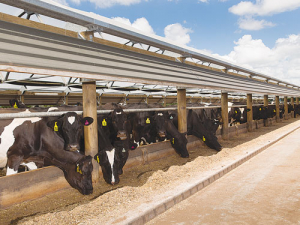Feeding maize silage in winter: Setting the herd up for success
As I write this article, we have just had our first frost in the Waikato, a change in weather signalling that winter is upon us.
 The biggest advantage of feeding maize is that feeding rates can be altered to key pasture residuals at optimum levels.
The biggest advantage of feeding maize is that feeding rates can be altered to key pasture residuals at optimum levels.
In little over a decade palm kernel extract (PKE) grew from being a little known by-product, to one of the most commonly used supplements on NZ dairy farms.
The expansion and intensification of dairying contributed to an increase in sales but, in my opinion, it was the easy accessibility of a relatively low-priced supplement that fuelled growth the most.
Growing on farm crops like maize is cheaper than buying in palm kernel, but it also requires forward planning. Palm kernel was an easy fix for farmers who fell into feed holes and didn’t have some form of supplementary feed (e.g. a stack of maize) on farm. In my opinion the easy accessibility of PKE helped create sloppy pasture management practices.
Now Fonterra is trying to persuade farmers to use less palm kernel. They have developed a test that measures the fat evaluation index (FEI). The co-op says “A recently completed pilot study with 200 farmers around the country has confirmed the test is accurate and fit for purpose. The study’s findings support our original voluntary guideline of 3kg/cow/day is a good rule of thumb across the lactation season”. From April this year farmers will receive FEI results on their tanker docket and Fonterra will support farmers with test results that indicate their PKE use exceeds the guideline.
Miles Hurrell, group director cooperative affairs, says “In general, we know that in international markets we get a premium for our milk because of our pasture-based system. We see reduced PKE use as a positive step toward protecting that grass-fed reputation and our product integrity.”
Landcorp, the country’s largest farmer, has announced it will transition to alternative feed supplements by June 2017. Chief executive Steven Carden says “Landcorp wants our partners and customers to know they can trust that we farm sustainably and care for the environment. We need to anticipate shifting consumer expectations on how their food is produced and change how we farm accordingly.”
As palm kernel usage on farms fall, improved pasture yields coupled with a stack of maize silage can help fill the feed deficits. Maize (a member of the grass family) harvested as silage is a great option because:
It can be fed in high amounts. PKE will no longer be the solution for large and unpredicted feed deficits. In contrast, maize silage can safely be fed at high rates in periods of large pasture deficits.
It is locally grown. It is free from the biosecurity risk associated with imported feeds.
It can be stored for long periods without its quality deteriorating. I’ve seen farmers feeding excellent quality maize silage that is three or more seasons old. The key is to ensure it is well compacted, covered with a high quality cover and the edges are sealed.
It is an excellent cow conditioner. DairyNZ research has shown there is no significant difference in the amount of palm kernel or maize silage required to put on cow condition score.
It drives milk production. A number of the country’s leading dairy farmers are producing at least 500kgMS/cow/year on pasture and maize silage.
It is cost-effective. Most NZ dairy farmers can grow maize silage crops yielding 18-26 tDM/ha for 11-16c/kgDM in the stack.
It is environmentally sustainable. Many regional councils are looking to ban winter grazed forage crops because they result in high nitrogen and phosphorus losses. Maize silage fed on a feed pad is one of the key ways farmers can reduce nutrient losses.
Perhaps the biggest advantage of maize is that feeding rates can be altered to keep pasture residuals at optimal levels. Maize plus grass represents a winning system that is profitable and sustainable.
• Ian Williams is a Pioneer forage specialist. Contact This email address is being protected from spambots. You need JavaScript enabled to view it.
OPINION: Trade Minister Todd McClay and the trade negotiator in government have presented Kiwis with an amazing gift for 2026 - a long awaited and critical free trade deal with India.
Former Agriculture Minister Nathan Guy says he's excited about his new role as NZ's Special Agricultural Trade Envoy.
A pillar of New Zealand's horticultural industry, Dr Stuart Davis, was farewelled at a well-attended funeral service in Tuakau, South Auckland, on December 18.
A stable but uncertain year lies ahead for New Zealand primary products, says Ministry for Primary Industries (MPI) Director General, Ray Smith.
Additional tariffs introduced by the Chinese Government last month on beef imports should favour New Zealand farmers and exporters.
Dairy prices have jumped in the overnight Global Dairy Trade (GDT) auction, breaking a five-month negative streak.
President Donald Trump’s decision to impose tariffs on imports into the US is doing good things for global trade, according…
Seen a giant cheese roll rolling along Southland’s roads?